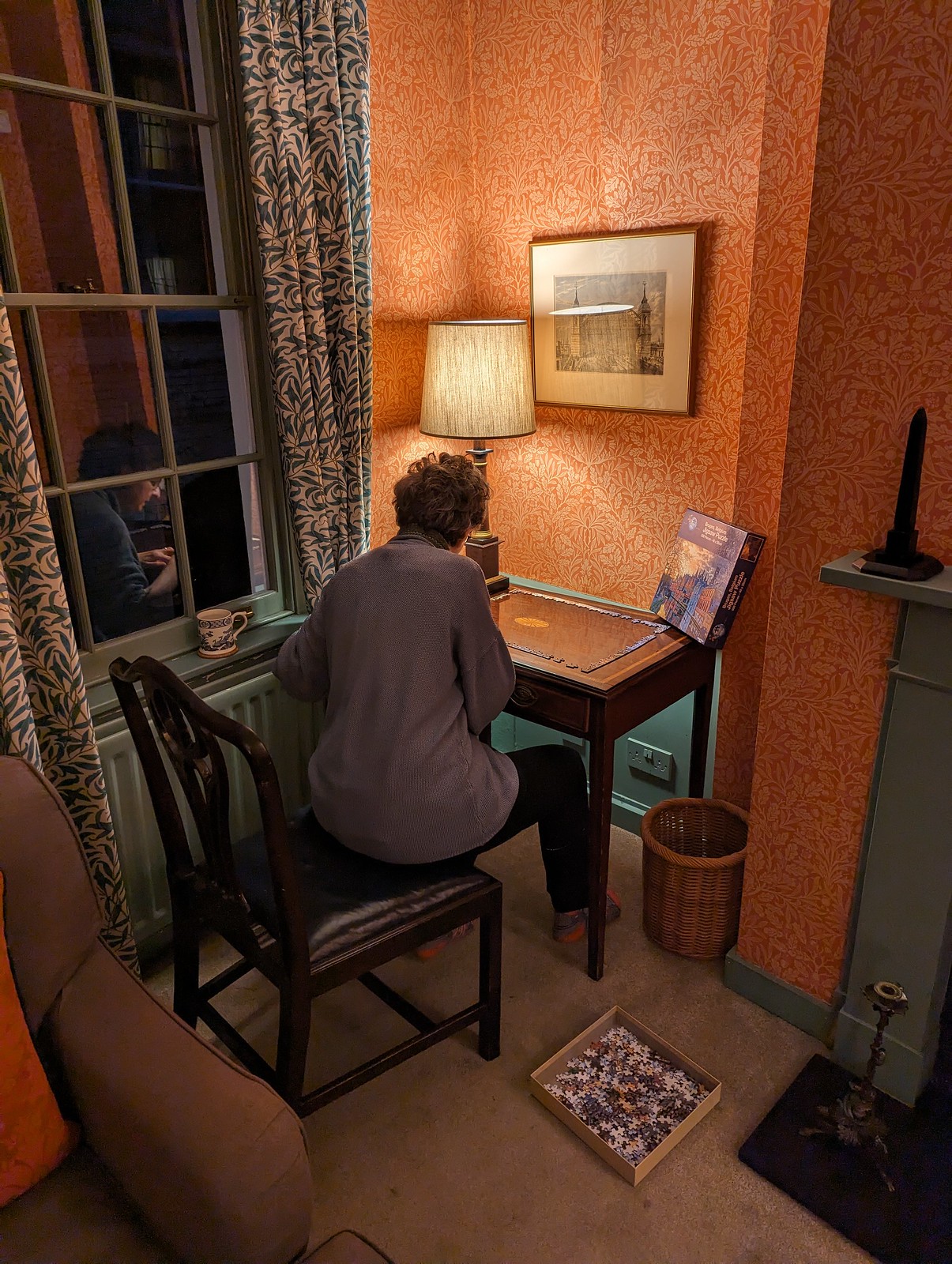 Red Sister by Mark Lawrence isn't dreadful sci-fi nonsense, because it isn't sci-fi; it's closer to fantasy. Teenage wish-fulfilment fantasy. That doesn't of itself make it bad; after all Harry Potter is much the same. I got this because I've been reading - and enjoying - The Book That Wouldn’t Burn - in W/S, and felt like buying something on a Friday to last the weekend.
Red Sister by Mark Lawrence isn't dreadful sci-fi nonsense, because it isn't sci-fi; it's closer to fantasy. Teenage wish-fulfilment fantasy. That doesn't of itself make it bad; after all Harry Potter is much the same. I got this because I've been reading - and enjoying - The Book That Wouldn’t Burn - in W/S, and felt like buying something on a Friday to last the weekend.Life
William's life. And something of those around.
Friday 26 April 2024
Book review: Red Sister
 Red Sister by Mark Lawrence isn't dreadful sci-fi nonsense, because it isn't sci-fi; it's closer to fantasy. Teenage wish-fulfilment fantasy. That doesn't of itself make it bad; after all Harry Potter is much the same. I got this because I've been reading - and enjoying - The Book That Wouldn’t Burn - in W/S, and felt like buying something on a Friday to last the weekend.
Red Sister by Mark Lawrence isn't dreadful sci-fi nonsense, because it isn't sci-fi; it's closer to fantasy. Teenage wish-fulfilment fantasy. That doesn't of itself make it bad; after all Harry Potter is much the same. I got this because I've been reading - and enjoying - The Book That Wouldn’t Burn - in W/S, and felt like buying something on a Friday to last the weekend.Monday 8 April 2024
Film review: My Neighbor Totoro
 My Neighbor Totoro is a 1988 Japanese animated fantasy film. We seem to be having a season of these; see-also Princess Mononoke and Spirited Away. It is lighter than both of those.
My Neighbor Totoro is a 1988 Japanese animated fantasy film. We seem to be having a season of these; see-also Princess Mononoke and Spirited Away. It is lighter than both of those.Two young sisters move into the japanese countryside with their father; their mother, it emerges, is in hospital with some unnamed illness. It is all rice-paddies and bicycles and everything is charming.
They meet "friendly wood spirits" and a weird catbus, and despite a scare when the younger sister goes missing, all is well.
There is a slight undercurrent of menace, we felt, though it is hard to know if it is really there or we were merely projecting our expectations. Certainly it would not have been surprising if the frog-faced old "grannie" had turned out to be an evil spirit; but actually she's just a genuinely nice old lady.
Wednesday 3 April 2024
Shoe size
 In the course of buying new boots, I was given cause to doubt my long-established shoe size of 10.5 to 11. Here is a machine-measurement (Ellis Brigham, Cambridge) showing UK 9 / EU 43, and here is another (EB, London) showing... UK 9.5, EU 43. However, trying on EU 43 was a complete failure; and EU 46 was far more plausible.
In the course of buying new boots, I was given cause to doubt my long-established shoe size of 10.5 to 11. Here is a machine-measurement (Ellis Brigham, Cambridge) showing UK 9 / EU 43, and here is another (EB, London) showing... UK 9.5, EU 43. However, trying on EU 43 was a complete failure; and EU 46 was far more plausible.The "asic" el-cheapo yellow-lined trainers I have, which are about the right size, show 29.5 cm, US 12, EU 46.5 marks.
The Adidas Boston Adizero, again well-fitting, "yellow-green rand" version, have just about legible on one shoe marks of US 11.5, UK 11, EU 46.
Sunday 31 March 2024
Peaks: Stanage and Froggatt
So a bit before 11 we left the car at the already-full carpark and headed up. This was Mi's first time out in the Real World. GPS trace. I lead Flying Buttress, and we watched someone doing the direct. Still a good route, and quite "interesting" getting from the side onto the slab on top. From there we moved not-very-far to Leaning Buttress Indirect, which D lead easily (well it is only VD).
From the ground E didn't believe it is possible to squeeze through the "Bishop's move" but it is. Oh, and D then top-roped the HVS direct.
After that to Hollybush Crack, which gets about my fourth ascent, but it is still fun. The start was easier this time; perhaps because it was entirely dry. I lead in my lovely Magdalen tights. And here's E and Mi at the top, with the landscape stretching away. My old helmet doesn't really suit Mi, but then again it never suited me either.
Lunch again at Outside, and I tried on various mountaineering boots, without finding a pair I really liked. Perhaps the Aequilibrium that EB had in Cambridge?
And so to Froggatt, now quite late, indeed we didn't start walking in till about 4:30. At this point the light was lovely, although the direction made for a poor photo. People were packing up so it was quiet. We did Allen's Slab, S; D lead it easily, I followed with slight trepidation on the rising traverse and even more on the pull up, but managed to force faith-in-friction onto myself and get my leg far enough up, and was up. It was good that D was so well within himself, because his gear was not the finest; but that's fine, part of the point is the practice (here's someone on Youtube massively over-gearing it, and also evading the crux by going a bit further R into the next crack, for the pull-up). E and Mi decided not to follow but go up the D (Slab Recess) which lead to the comedy of oh-we-need-to-get-D's-gear-out, but fortunately it fell out by itself while fiddling the rope.
And so away. By the end the sun was setting, and the light and the trees were even more lovely.
Refs
* Peaks: Stanage and Birchens (2023/04/08).
* Boxing Day at Horseshoe Quarry (2022/12/27).
* A trip to Pembroke (2022/09).
* The leaves of Chatsworth lie thick on the ground (2015/11/15).
* Stanage with Daniel and Jamie (2014/05/25).
* Chatsworth with Howard (2014/03).
* Stanage; us with Howard and others (2010/04).
Tuesday 26 March 2024
London: Cloth Fair, Wigmore, Westminster, Courtauld, National Gallery, St Bartholomew the Great, RA
It was Betjeman's pied a terre. This is a "photo essay", which is to say I shall not trouble you with many words. If you don't recognise the pictures... check your culture. Full photo set here.
That's at the Wigmore Hall. Next morning, Westminster Abbey, which neither of us has ever seen, we think. I hadn't realised just how stuffed full of memorials it is. Some discretely understated:
And some absurdly elaborate, like this life-size figure, one of four:
And the flag-chapel is stunning.
Then off to the Courtauld, and would you believe that M wanted lunch?
I'm having an only-take-famous-pictures jag.
Fortunately the C, whilst not the largest collection, is relatively free of fluff.
I'd better stop there. We move on to the National Gallery.
I finally found this. Sorry about the reflections near the top, the NG aren't very good with their lighting.
Skipping lightly over my favourite spiderman and Bosch, we close with
Famous from my O-level history textbook on the development of the English in the 17th or whatever century. Home, via sunset views of St Paul's and quasi-dream views of alien spaceships. M, who had skipped the NG, was hard at work at home.
Sunday morning dawned. I had a quick walk around, which I spent entirely in St Bartholomew the Great, it being more interesting than I'd expected from Pevsner, with a lovely old feel.
There was a service going on, but they had gathered at the far end in the shelter of the altar so I wasn't disturbing them. Thence to the RA for intersectional coloniality and so on, which alas wasn't to my tastes particularly artistically interesting (I should have taken the large vibrant guy posing against a bright abstract background which Aesthetica has the good taste to highlight).
Flaming June, and some other RA-type stuff, is tucked away at the back.
After that we parted ways, M to church-crawl and me to Vets Head.
Tuesday 12 March 2024
A visit to Magdalen and Elias
The cloisters, by the Old Library stair. I quite like "light in the cloisters" too, but I can't inline every one.
And above the archway, just visible in the picture above:
Addiscombe's walk. Alas I didn't find fritillaries, but Miriam did. Don't miss Lewis's poem.
Nearly at the end of the Walk:
Funeral pall of Henry VII (Cloth of Gold):
Dutch tiles; note Noah's ark.
St Catherine.
Refs
* Ashmolean: Egypt (2023/12)
* Cezanne: a trip to London (2023/03)
Book review: The Load of Unicorn
 The Load of Unicorn is a children's historical novel written and illustrated by Cynthia Harnett. It was first published in 1959, as wiki will tell you.
The Load of Unicorn is a children's historical novel written and illustrated by Cynthia Harnett. It was first published in 1959, as wiki will tell you.
























